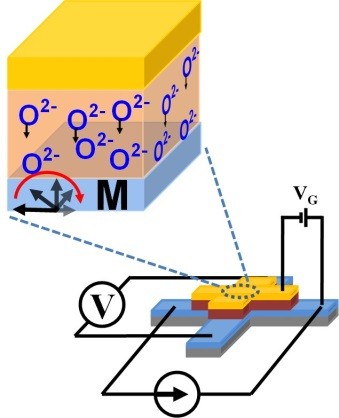A Breakthrough in Switching
 Photo: © 2014 American Physical
Society
Photo: © 2014 American Physical
Society
Weigang Wang, Argonne Laboratories, and C-SPIN Researchers Explain a New Energy-Efficient Switching Method
(01/05/2015) - Collaborators led by C-SPIN PI Weigang Wang of the University of Arizona have just published an article on voltage-controlled magnetism in Physical Review Letters.
The paper reports that magnetic properties of ultrathin Co films adjacent to Gd2O3 gate oxides can be directly manipulated by low amounts of voltage. In particular, a few volts can switch a Co film from having strong perpendicular anisotropy to having in-plane anisotropy and even no anisotropy. Moreover, these switches are non-volatile -- that is, they do not need continued applied voltage to maintain their new magnetic state.
According to C-SPIN Director Jian-Ping Wang, this is a significant advance toward spin-based memory and processor. “Power requirements for spin-based switching have been an obstacle to spin computing for quite some time,” says Wang. “Observing and understanding this super-efficient switching opens to door to a lot of new spin-based devices.”
According to Weigang Wang, the oxygen atoms in the Gd2O3 account for the giant control of magnetic properties. “The applied voltage basically moves the oxygen atoms to the Co layer, directly changing the magnetic anisotropy energy of the Co film,” explains Wang. (See picture at right.) “This is helpful to understand, but what’s most exciting is knowing that we can switch the anisotropy at will with discrete applications of voltage.”
The paper is the result of extensive collaboration of Wang’s group at the University of Arizona with Argonne National Laboratories and fellow C-SPIN PI Oleg Myrasov at the University of Alabama. Moreover, the research in the paper was built upon an initial discovery reported last year in Nature Nanotechnology by C-SPIN PI Geoff Beach’s lab at MIT, which also led to a Nature Materials paper from the Beach lab a few months ago on the very efficient control of interfacial magnetism by voltage. “It’s another example of the important role of C-SPIN,” says Director Jian-Ping Wang. “With funding from the STARnet program dedicated to world-class collaboration, important discoveries will be made and groundbreaking theoretical models will be developed.”


